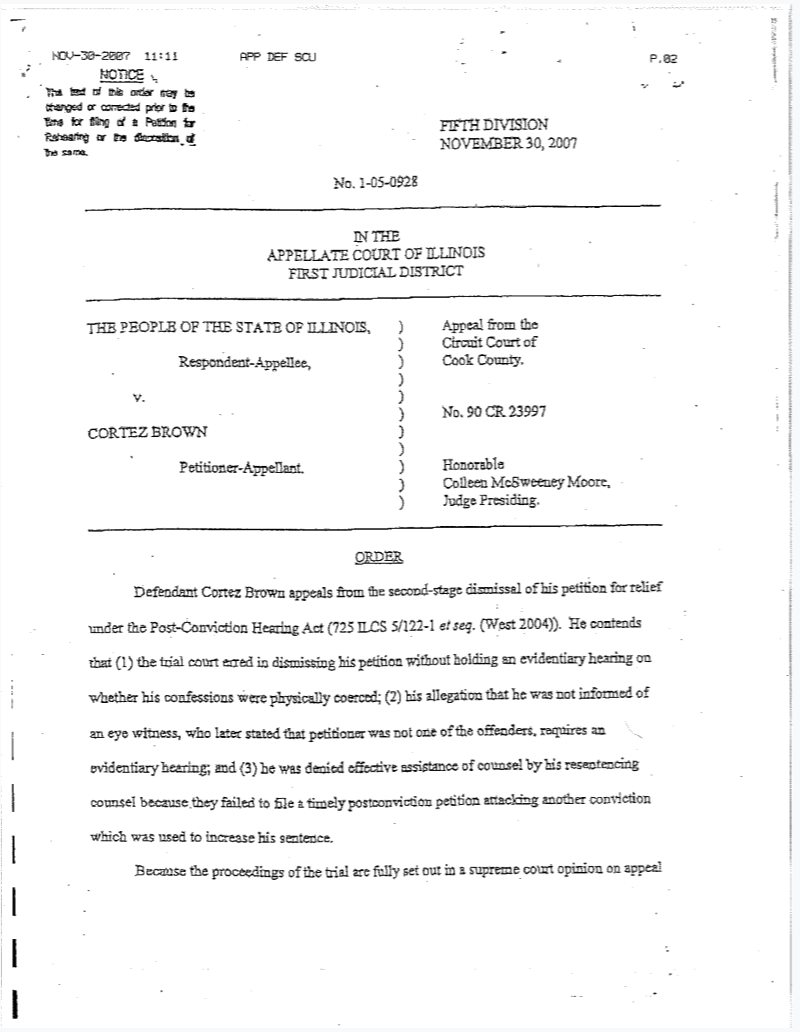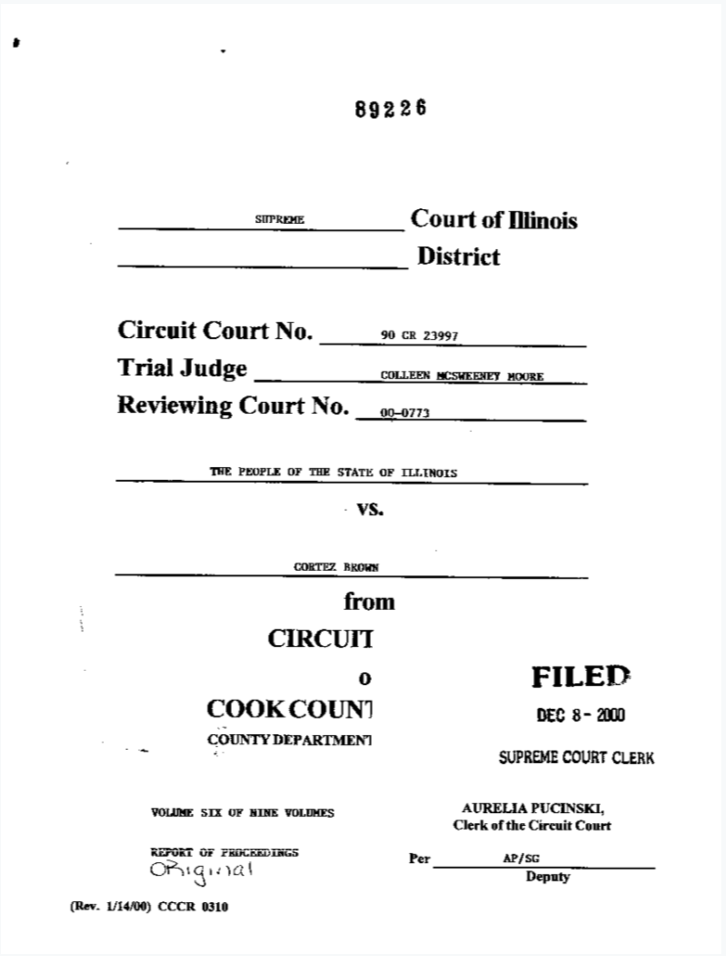The following profile has been republished with permission from The National Registry of Exonerations.
Victor Safforld was arrested on September 20, 1990 after police in the Chicago suburb of Park Forest pulled over a car he was riding in. The car had been reported stolen. Safforld spent the night in the Park Forest lockup and was taken the next day to Chicago for questioning about two recent homicides on the city’s South Side. Curtis Sims had been shot to death on June 9, 1990, and Devin Boelter had been shot to death on September 16, 1990. Both deaths were seen as gang related.
Safforld, who then went by the name Cortez Brown, was initially taken to the Area 1 Police Headquarters. He told police that he didn’t want to be questioned without an attorney, and he asked to make a telephone call. He called his mother, told her what had happened, and asked her to call his attorney to meet him at the Area 1 Station.
In the afternoon, before his attorney showed up, Safforld was moved to the Area 3 Police Headquarters. Safforld protested the move and said his attorney wouldn’t be able to find him. He was assured that the attorney would be notified.
Many of the detectives at the Area 3 Police Headquarters were under the command of Lt. Jon Burge, who would later be convicted in federal court of perjury for lying during questioning in lawsuits brought by torture victims.
Upon arriving at the Area 3 Station, Safforld asked to use the telephone to call his attorney. Police refused his request. At about 5:30, Chicago police detectives began questioning Safforld about the Sims and Boelter murders. Safforld said he didn’t want to make a statement without his attorney present. A detective told him he was being a “smart aleck.”
Questioning turns violent
After a brief round of questioning, the detectives left the room, and Safforld remained handcuffed to the wall. When the detectives returned, they again asked Safforld about the murders. He said he didn’t know anything, and then a detective slapped him in the face. Eventually, they began hitting him with a flashlight in the face, chest, arms, and legs. They said a man named Dwayne Macklin, who would also be charged in Sims’s death, had given them incriminating information about Safforld’s role in the killing.
The detectives told Safforld that he was likely to get the death penalty or life without parole if he didn’t cooperate, but that if he provided evidence against Macklin, he might be allowed to go home.
Safforld said he would make a statement. He was taken to another room where he described the two murders. The statement did not directly inculpate Safforld.
The detectives read the statement and said it wasn’t sufficient; Safforld needed to make a full confession. He was handcuffed to the wall and then beaten again. Finally, he agreed to cooperate and change his statement to something more in line with what the officers wanted. An assistant state’s attorney was brought into the interrogation room, and Safforld signed separate confessions for the two murders.
Two convictions for murder
Prior to the start of either trial, Safforld moved to suppress both statements. During two days of hearings, on November 8, 1991 and January 23, 1992, the detectives involved in Safforld’s interrogation denied any abuse. Safforld also testified, and he would later claim that his attorney was deficient by failing to elicit from him a complete account of the interrogation process. The assistant state’s attorney who took Safforld’s statement and the court reporter also testified that they saw no abuse, and there was no evidence introduced to substantiate Safforld’s claim. The motion to suppress was denied.
Safforld was convicted by a jury in Cook County Circuit Court in May 1992 of murder in Boelter’s death. He was sentenced to 35 years in prison. In September, he was convicted of capital murder in Sims’s death and sentenced to death. The statements were the centerpiece of both cases.
In 1995, Safforld’s conviction for the Boelter murder was overturned on appeal due to faulty juror instructions. Safforld chose to have a bench retrial. He was convicted on February 24, 1997 and sentenced to 30 years in prison. He finished serving that sentence in 2005.
In the Sims case, the Illinois Supreme Court vacated Safforld’s sentence in 1996. He was then resentenced to death in 1999. While his appeal was pending, Gov. George Ryan commuted his sentence in 2003 to a “sentence other than death.”
In 2002, Special Prosecutor Edward Egan was appointed by the Cook County Circuit Court to investigate wide-ranging claims involving Jon Burge and the officers under his command. His final report, issued in 2006, named several of the officers involved in Safforld’s interrogation, including Anthony Maslanka, whom Egan concluded likely committed perjury.
In 2008, Safforld filed a motion for post-conviction relief in the Sims case. He was now represented by Locke Bowman at the MacArthur Justice Center at Northwestern University’s School of Law and Flint Taylor with the People’s Law Office in Chicago. The attorneys asserted in the motion that Egan’s investigation and other developments in the widening scandal over Burge’s conduct gave Safforld new evidence to challenge his purported confessions. The motion said that the state had failed to disclose the pattern of abuse by Chicago police detectives and that his attorney had been ineffective in investigating Safforld’s claims of abuse. A judge in Cook County Circuit Court dismissed his motion, but the Illinois Appellate Court reversed that decision in 2007, stating that the lower court needed to hold an evidentiary hearing to explore Safforld’s claims.
A new plea deal
The hearing was held before Judge Clayton Crane in Cook County Circuit Court. None of the officers testified. By then, Burge had been charged with obstruction of justice and perjury.
On May 22, 2009, Crane vacated the convictions for both murders and ordered new trials. He noted that the hearings were essentially for a new motion to suppress the statements, and while there was plenty of evidence to sift through, the only person who testified about what happened in the interrogation room was Safforld. “The present or past detectives were silent,” he said in his ruling. “I am taking that silence into consideration.”
Under the terms of a deal worked out in May 2010 between Safforld’s attorneys and the Cook County state’s attorney, Safforld agreed to plead guilty to murder in the death of Curtis Sims, and the murder charge in the death of Devin Boelter was dismissed. As part of the deal, he was released from prison on September 21, 2010.
By the time Safforld left prison, Burge had been convicted. Safforld told the Final Call that bad officers have a corrosive impact on the communities they are supposed to serve.
“Whenever you have a bad officer that infects the police department, he corrupts good officers and the good officers become cowards and that's why you have all these people in prison today,” he said.
– Written by Ken Otterbourg




